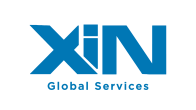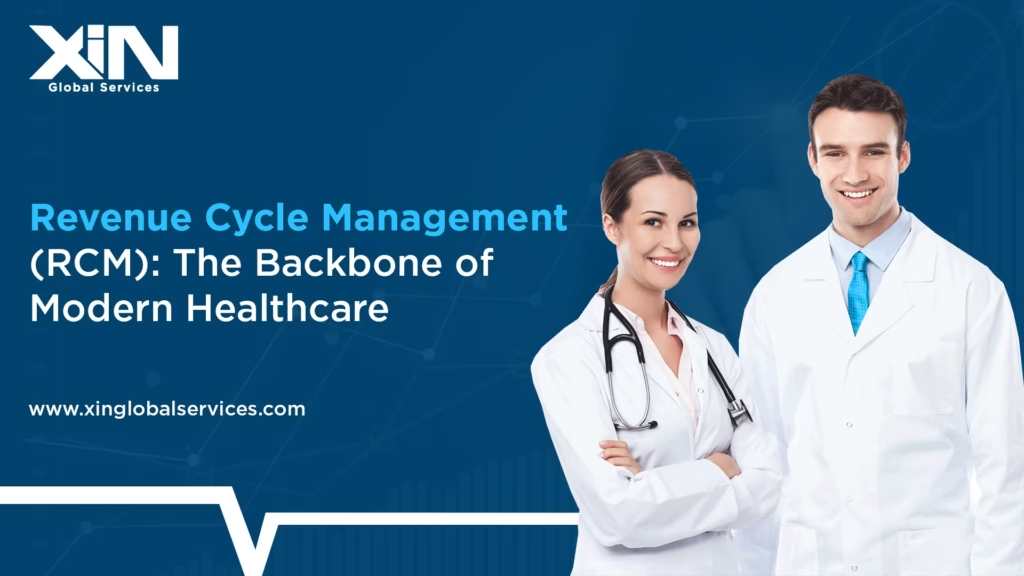RCM: The Backbone of Modern Healthcare
In the rapidly changing healthcare environment, Revenue Cycle Management (RCM) plays an increasingly vital role in ensuring operational success. However, it is important to note that healthcare providers often view addressing billing and payment collection.
This stands in sharp contrast to the common perception of revenue cycle management as merely a routine business task. From our end in Xin Global Services, we understand how powerful implementing strong RCM adjustments can transform businesses.
This article explains the key components of revenue cycle management, explores its role in today’s healthcare system, and suggests ways to enhance it for better results.
- Financial Sustainability
Excessive Denial Rates: Coding, billing, and documentation challenges often result in claims not processing fully.
Human Resource Constraints: Additionally, organizations typically lack the workforce needed to effectively implement RCM.
This part explains the importance of compliance with regulations.
- RCM is beneficial for avoiding risks in audits or penalties. Compliance with legal and regulatory requirements is particularly complex in healthcare.
- First of all, as the patients today have started becoming complex, their complaints have also increased. They want precise and clear bills, more payment options, and minimal waiting time.
- Every patient wants a process assurance with no margin for error in billing. An organized RCM process thus allows for less confusion during interactions and minimizes errors in billing.
RCM is important as every action has a direct effect on the financial activities of the organization.
- Advanced Revenue Cycle Management systems provide healthcare organizations with more in-depth analytics for revenue trends, claim denials, and operational shortcomings.
What are the challenges faced in revenue cycle management?
1. Insanity of Payers’ Guidelines: It is cumbersome to address the myriad of payers’ guidelines.
2. Excessive Denial Rates: Coding, billing, and documentation can often be challenging; as a result, claims sometimes fail to process fully.
3. Human Resource Constraints: Moreover, apart from one or two employees, such organizations often lack the necessary workforce to effectively implement and adapt RCM.
4. Lack of Resources: The old fashioned ways of doing things can be a barrier to how effective the revenue cycle operations can be.
5. RCM process can get very complex as patients also face challenges in making payments.
Outsourcing’s Significance in RCM
In-house Revenue Cycle Management (RCM) can be challenging for many healthcare providers. There are various advantages of outsourcing RCM to experienced partners like Xin Global Services:
1. Expertise Access: RCM professionals provide significant awareness of industry trends and regulations.
- Cost Savings: Outsourcing decreases operating costs and does deal with the demand for additional staffing.
- Focus on Core Activities: Instead of dealing with administrative tasks, providers can, therefore, redirect their attention to delivering excellent care to patients.
- Scalable Solutions: RCM providers give flexible services that change based on the needs and measure of the organization.
How RCM is Improved by Xin Global Services
Every healthcare company is different, and we at Xin Global Services recognize this. For this reason, we offer customized RCM solutions that cater to our clients’ specific needs.
Here’s how our team can help:
End-to-End Revenue Cycle Management: We manage the complete cycle, from registering patients to payment posting, to ensure accuracy and efficiency.
Innovative Technology Integration: Our modern solutions offer real-time insights, reduce errors, and streamline workflows.
Denial Detection and Resolution: With the goal to achieve the highest reimbursement rates, we proactively address difficulties resulting in claim denials.
Patient-Centric Solutions: We enhance satisfaction and collections by delivering patient-friendly payment and billing solutions.
Regulatory expertise: To assure compliance and reduce risks, we follow up with changes in the industry.
Healthcare is supported by Xin Global Services, which values innovation and excellence.
RCM’s Opportunities in Healthcare
RCM’s future will be interconnected with patient expectations and advances in technology. Several trends affect the RCM landscape:
1. Artificial Intelligence (AI): solutions based on AI will enhance accuracy and efficiency by automation repetitive tasks like denial resolution and coding.
2. Blockchain: Blockchain may simplify claims processing and lower fraud by allowing transparent and safe data sharing.
3. Patient-Centric RCM: As healthcare consumerism rises, patient satisfaction and engagement will be given top priority in RCM systems.
- Predictive Analytics: Companies can predict revenue trends and proactively handle potential challenges with the aid of advanced analytics.
Healthcare companies can create sustainable revenue cycles that promote sustainable growth by staying forward of these trends.
Conclusion:
Revenue Cycle Management (RCM) transformed from a back-office task to a strategic pillar for healthcare organizations looking to strike a balance between care for patients and financial stability. Providers can succeed in an increasingly complicated business by focusing on dealing with patients, adopting modern technologies, and reducing RCM procedures.
Our goal at Xin Global Services is to assist healthcare organizations in realizing the full value of their revenue cycles. You are able to focus on what really matters—providing superior patient care—with our expertise and tailored solutions.



